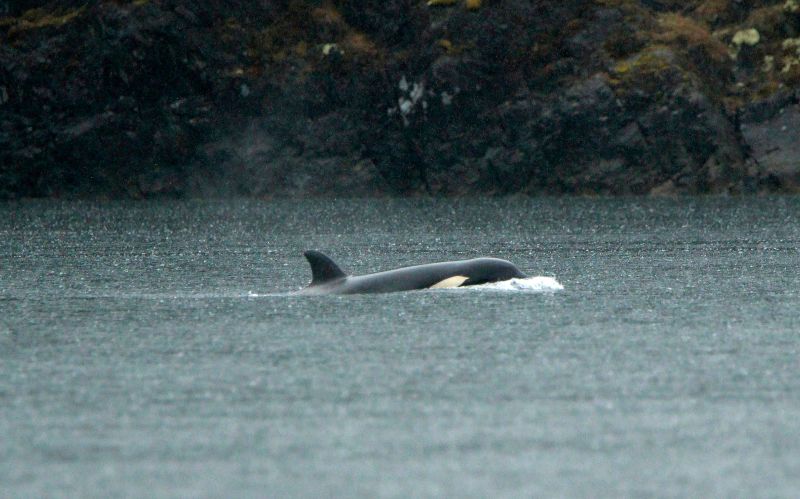A team of rescuers has suspended its efforts to save an orca calf that has been stranded for nearly two weeks in a remote lagoon on Vancouver Island off the west coast of Canada.
Crews with the Department of Fisheries and Oceans and the Ehattesaht First Nation made the decision Friday afternoon the orca calf was not ready to be moved and stood down from their rescue attempt, according to a news release from the department.
The calf became stranded in the Zeballos lagoon after its mother got trapped on a sandbar in the lagoon’s shallow waters and died on March 23. The mother was pregnant at the time of her death.
Crews tried several methods to coax the calf into the shallow area of the lagoon but she refused, the release said. Friday’s operation was the result of almost a week of planning and the work of 50 people, including six boats and 15 people in the water. Meanwhile, the whale has received an outpouring of love from the surrounding community as they hope for it to be reunited with its family.
“It is during efforts like this that many of us are truly humbled at the intelligence, adaptability and resilience of the orca,” department officials said in the statement. “No matter how much we study these amazing creatures the more we realize how little we know.”
Officials have been monitoring the calf daily and working to formulate the best plan to relocate the animal and reunite it with its family pod. The orca is still in good health and swimming well, according to veterinarians who assessed the animal.
Dr. Martin Haulena, a veterinarian with the Vancouver Aquarium, said the veterinary team got a closer look at the whale than they have in the past. The orca is “doing very well” and there are no critical animal health concerns, but its skin is turning a little white, which might have to do with the lagoon’s salinity, Haulena said. It is difficult to tell whether the calf is eating, though there are duck, seals and fish in the lagoon, so the immediate need is to provide her nutrition in some way.
“This is not a spot where she should normally be and she is not with the whales that she should normally be accompanied by. And she’s a very young whale that would normally still be very close to her mother and depending on her mother for things,” Haulena said at a news conference Friday. “In the long-term, this is not a great situation by any stretch.”
Crews are taking Friday afternoon to work on planning the next steps for the rescue operation. They have tried multiple methods to get the calf to leave the lagoon on its own, including “acoustic playbacks” – playing the sounds of other orca whales, but nothing worked, Paul Cottrell with Fisheries and Oceans Canada said earlier Thursday.
“Some of the techniques that we’ve been using in the past, they’re less effective, unfortunately, as we use them more,” Cottrell said at a news conference Friday. “So we are looking to change our approach going forward to maybe a different tactic and we’re gonna be working on that in the next while to see if we can implement that, some planning and logistic changes, to see if we can help this poor calf get back to its family.”
With the orca reluctant to leave the area, Cottrell said, they will have to work within the space to see if they can isolate the whale.
Officials initially planned to transport the calf using a helicopter, but pivoted to using a truck and boat to avoid stressing the animal. They hope to eventually lure the calf into an area where they can move it onto a truck then drive the animal and place it on a boat, which would bring it into a net pod, Ehattesaht First Nation Chief Simon John said. They plan to continue the rescue operation within a few days, John said Friday.
The orca, which locals have named “Little Brave Hunter” or “Kʷiisaḥiʔis” in the Ehattesaht First Nation language and writing system, will then wait in the net pen until its family passes by. It will hopefully be released and reunite with its relatives, John explained. The net pen is planned to be in Esperanza, southeast of Zeballos.
Officials hope they can implement the plan within the next week. “It’s a huge effort and we have a long way to go,” Cottrell said. “We’re hoping for the best possible outcome.”
The orca’s family pod was last spotted March 30.
“There’s a lot of eyes and ears that are looking out for the related pod,” Cottrell said Friday. “There’s a very high likelihood in a short amount of time there will be some sort of interaction or reunion and that’s what we’re hoping for.”
“This whale’s skin has just started to slough in sizable patches along the top of the head and base of the dorsal fin on each side perhaps due to the freshwater runoff into the lagoon it is in,” says the organization.
Moving the orca calf “will require a lot of patience as well as cooperation from the whale,” Bay Cetology added.
Orcas – also known as killer whales – are found in all the world’s oceans, according to the National Oceanic and Atmospheric Administration. They are highly social, living in family pods of up to 20 or more whales. Calves typically stay with their mothers for the first two years of life, according to the agency.
This is not the first time officials in Canada have strategized to rescue a solitary and stranded orca calf. In 2002, an orca calf who came to be named Springer was spotted alone in Puget Sound, prompting an extensive capture and relocation effort. She is considered the first orca in history to successfully rejoin a wild population after human intervention.



























